This month we are celebrating Versinetic’s 2nd birthday. Having started out in the midst of a global pandemic, we are proud to see how far Versinetic has come since its inception on 17th November 2020!
We thought it would be great to also reflect on the crucial breakthroughs that the EV industry has seen, over the last couple of centuries.
Yes, that’s right – centuries.
Contrary to what many people believe, the electric vehicle is not a modern-day invention. In fact, you can trace its route through history.!
Let’s time travel together and revisit some of the key milestones for the EV industry, in both the past and recent history.
 1. 1832 – The First Crude Electric Vehicle…
1. 1832 – The First Crude Electric Vehicle…
…is believed to have been developed by Scottish inventor, Robert Anderson.[1] It took the form of a carriage, as this reflected the times where horse-and-carriage was the main mode of transport. According to records, it was a good forty years later before an electric car design became more practical.
2. 1899 – La Jamais Contente…
…(which translates as The Never Contented) was the first car to reach the speed of 100mph, which also happened to be an electric vehicle. [2] This impressive feat was achieved in France on 1st May 1899. Running two 25kW direct drive motors at 200V, the car sped along on Michelin tyres.
 3. 1982 – The Formation Of Pop Group A-Ha!
3. 1982 – The Formation Of Pop Group A-Ha!
Many people don’t expect popstars or groups to be activists, but quite often they are. What makes A-Ha special, is they lead the EV revolution in Norway.[3] How did they do this? Their main mode of transport was a converted Fiat Panda. While driving this vehicle around, they refused to pay tolls in Norway, as it was electric. Their car was repeatedly impounded and put up for auction, whereupon the band simply bought it back again. With this simple act of protest, they eventually managed to influence a change in Norwegian laws that turned Norway into the international EV leader.
4. 1987 – The Sunraycer Won The First World Solar Challenge
Racing across Australia, the purely solar powered Sunraycer won the very first World Solar Challenge. [4] Designed by General Motors, the success of the Sunraycer gave the company the critical engineering expertise to design the famous EV1.
 5. 1996 – General Motors Releases The GM EV1 – The First Modern EV!
5. 1996 – General Motors Releases The GM EV1 – The First Modern EV!
EV1 was designed and produced in response to a Californian law (the Zero Emission Vehicle mandate), which stated that 10% of in-state cars had to be zero emissions by 2003. Widely popular, even celebrities such as Danny DeVito leased one. Under pressure from auto makers the government revoked their ZEV mandate in 2003 and shockingly, GM scrapped the EV1 [5], recalling all of the cars under terms of the lease. They then destroyed the majority of them. To this day, there is still much controversy about whether or not GM self-sabotaged their first electric car venture.
6. 1997 – Toyota Introduces The First Mass-Produced Hybrid, The Prius.
First released in Japan, in 1997, the Prius was subsequently rolled out worldwide in 2000 and quickly became popular with celebrities. This in turn raised the cars profile, who’s tagline was “Just in time for the 21st century”.[6]
 7. 2008 – Tesla’s Roadster Becomes The First Highway Legal, Serial Production, All-Electric Car.
7. 2008 – Tesla’s Roadster Becomes The First Highway Legal, Serial Production, All-Electric Car.
It is widely argued that the death of the EV1 influenced the birth of autocar maker Tesla, which was founded the same year. [7] Produced by Tesla Motors, now known as Tesla Inc., the Tesla Roaster used lithium-ion battery cells, which allowed it to be the first all-electric car to travel 200miles in one charge. [8]
8. 2011 – UK Government Publishes Plug-in Car Grant (PiCG).
To help kick-start the UK’s electric car revolution, the UK government announced a grant of up to £5,000 (25%) towards the purchase of a new electric vehicle.[9] The incentive was rolled out in January 2011 and a form of this grant continued until June 2022. At the time that the incentive came to an end, the Department for Transport had encouraged buyers to claim up to £1,500 on an EV that costed no more than £32,000.[10]
 9. 2020 – Versinetic Launches!
9. 2020 – Versinetic Launches!
Versinetic was founded following years of increasing demand for parent company ByteSnap Design’s EV charger development services. In November 2020, Versinetic launched with an industry leading, flexible modular ‘Charging Blox’ system: Consultancy + Hardware + Software. You can read more of Versinetic’s history on our About Us page.
10. 2021 – EU Parliament Adopts The EU Climate Law.
The aim of this mandate was to make legally binding the reduction of GHG emissions to at least 55%, compared to 1990 levels, and to further push forward to climate neutrality by 2050.[11] In other words, by 2050 there should be net zero emissions, meaning that GHG emissions must be cut through a shift to renewables and better energy efficiency, and offset by carbon sequestration, i.e., capturing and storing atmospheric carbon dioxide. The benefit of this now legally binding political commitment is that it gives certainty to businesses, such as car manufacturers, that they will need to plan for this transition.
 11. 2021 – Tesla Surpasses $1 Trillion Market Value.
11. 2021 – Tesla Surpasses $1 Trillion Market Value.
Tesla zoomed past this milestone after receiving the biggest-ever order from rental company Hertz. As a result, shares surged by 14.9% to $1,045.02, which made it the world’s most valuable autocar maker.[12]
12. 2021 – ABB Launches World’s Fastest Charger. ABB’s
ABB’s Terra 360, a modular charger which simultaneously charges up to four vehicles with dynamic power distribution, was released in 2021. The first chargers were installed in Norway, in 2022 and boast a delivery of 100km of range in less than three minutes.[13] The charger produces 44% quicker charge time than a Tesla supercharger.[14]
 13. 2021 – Europe’s First Fully Autonomous Bus Hits The Road.
13. 2021 – Europe’s First Fully Autonomous Bus Hits The Road.
A driverless bus in France became Europe’s first vehicle authorised to operate fully autonomously on a public road. The driverless EZ10 shuttle, which can carry up to 12 passengers, was approved for use without a human attendant on board.[15]
14. 2022 – Wooden Batteries Trialled For Sustainable Battery Power.
Finnish designer Stora Enso built a production facility to create renewable bio-based carbon by turning trees into batteries, achieved using lignin, a wood-based material.[16]
15. 2022 – UK Car Market Reaches 1 Million Plug-Ins!
In September 2022 we saw the SMMT publish the much-anticipated milestone of 1 million plug-in electric cars registered across the UK, with 249,575 joining the roads in 2022 alone. To give some context to how quickly the EV industry has grown, it took 6.3 years (2010 to 2017) for the first 100,000 plug-ins to be sold (100,754 by April 2017). It then took only 5 years to sell the next 900,000!
16. 2022 – First Hybrid Battery Train To Run As European Passenger Service.
Hitachi Rail and Italy’s train operator Trenitalia unveiled its hybrid train, the “Blues Train”. The hybrid train is set to cut emissions by more than 50% and can carry up to 300 passengers, reaching a top speed of 160 km/h.[17]
17. 2022 – Eviation’s All-Electric Alice Completes Its First Flight.
To further emphasise the rate at which the EV industry is growing, another historic milestone for 2022 was that of the electric aviation industry. On 27th September 2022, Eviation’s Alice successfully took the first zero-emissions flight.[18] The invaluable data collected from this flight will help Eviation to further optimise their aircraft for commercial usage.
Have we missed anything important from our list? Let us know, we’d love to hear from you!

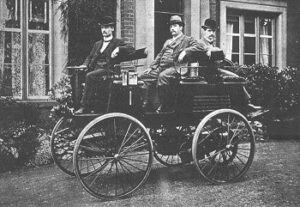 1. 1832 – The First Crude Electric Vehicle…
1. 1832 – The First Crude Electric Vehicle… 3. 1982 – The Formation Of Pop Group A-Ha!
3. 1982 – The Formation Of Pop Group A-Ha!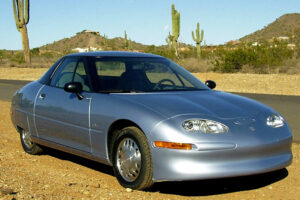 5. 1996 – General Motors Releases The GM EV1 – The First Modern EV!
5. 1996 – General Motors Releases The GM EV1 – The First Modern EV!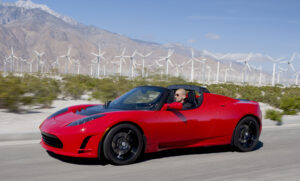 7. 2008 – Tesla’s Roadster Becomes The First Highway Legal, Serial Production, All-Electric Car.
7. 2008 – Tesla’s Roadster Becomes The First Highway Legal, Serial Production, All-Electric Car. 9. 2020 – Versinetic Launches!
9. 2020 – Versinetic Launches!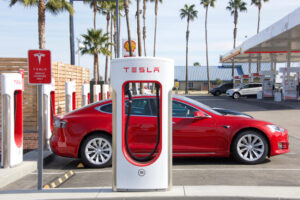 11. 2021 – Tesla Surpasses $1 Trillion Market Value.
11. 2021 – Tesla Surpasses $1 Trillion Market Value.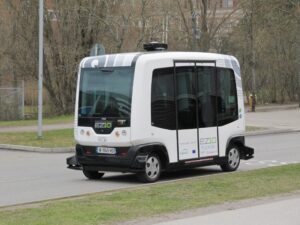 13. 2021 – Europe’s First Fully Autonomous Bus Hits The Road.
13. 2021 – Europe’s First Fully Autonomous Bus Hits The Road.

